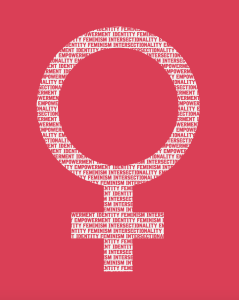Woman’s History Month events touch on multiple identities and experiences
Women’s History Month programming continued on March 22 with a screening of the Academy Award-nominated film, “Hidden Figures,” which highlighted the schedule’s goal of demonstrating the women’s experience from different lenses.
Student Inclusion and Diversity and the Women’s Center, in collaboration with Elaine Terry, Ph.D, assistant professor of mathematics and Katherine A. S. Sibley, Ph.D, professor of history, sponsored the screening and also held a discussion where Terry and Sibley talked about the issues women face in science, technology, engineering and math (STEM) education and in the workplace during the Space Race in the 1960s.
Over 50 students attended the event and watched how African American female mathematicians faced opposition due to their gender and race as they worked in NASA’s segregated Langley Research Center in Hampton, Va.
“There were a lot of students who I’ve never seen before,” said Kayla Walker, program coordinator for Women’s Center and LBGTQ programs in the Office of Inclusion and Diversity. “[Terry and Sibley] were able to reach out to more students than we would have just because of the difference of our networks. I think that’s why we do the collaborations so that we have more students seeing the
programming we’re doing this month and this is what we have to offer.”
During the discussion, the topic of the different dynamics and relationships explored throughout the movie, those between the working women and men in NASA and those between African American women and men, was brought up. Students talked about how there were different layers to the characters’ experiences, explored in their various interactions.
“I thought [the film] captured the intersectionalities of these women’s identities and their marginalization very well,” said Molly Ledbetter, ’17.
Forest Platzer, ’20, found it interesting how the events of the movie displayed that attitudes toward women preforming STEM-related work are not generally addressed. He was impressed how Dorothy Vaughn, portrayed by Octavia Spencer, taught herself the programming language, Fortran.
“I had a friend in high school who was taught Fortran, and it got them into MIT [Massachusetts Institute of Technology], so to teach herself Fortran is certainly nothing to scoff at,” Platzer said. “We need more women who are willing to tdo hat extra mile to convince the doubters of women’s capabilities being equal to that of anybody else regardless of race or any other identifying feature.”

Ledbetter called to attention one scene where Mary Jackson, portrayed by Janelle Monáe, attends a night class in a white high school in order to later become an engineer for NASA.
“The teacher states that the class’ curriculum isn’t written for a woman, and she responds, ‘Well, I imagine it’s the same as teaching a man’”, said Ledbetter. “Then she asks where to sit because she doesn’t see a colored section. I really appreciated how they packed all of that into one interaction in a scene.”
Walker was delighted to hear many of the attendants bring up the issue of intersectionality naturally. While the programming for Women’s History Month didn’t explicitly have a theme, many of the events set up touched on the idea of the many different identities a woman has. The Women’s Leadership Initiative hosted a performance of Eve Ensler’s The Vagina Monologues at the end of Feburary.
“[It] talks about how a woman experiences her vagina, but so many different women tell that story that it pulls on a lot of experiences,” said Walker. “We ending our month, our month and a half, with Kimberlé Crenshaw, who coined the term of intersectionality and has done a lot of research on how a lot of identities intersect. We had a starting point and an ending point, so it made sense to fill in the gaps and to continue talking about intersectionality throughout the month.”
Crenshaw, the civil rights advocate and professor at UCLA School of Law and at Columbia Law School, will visit St. Joe’s on April 11 as part of the Diversity Lecture Series.
Other Woman’s History Month’s events included Allies of Recovery Training by the Wellness, Alcohol & Drug Education (WADE Program) that focused on women in recovery, and a panel discussion that featured women in politics and public service.
“We know that there’s a woman’s experience, but then we also know that there’s a lot of different experiences in which you can also be a woman,” Walker said. “So let’s talk about what it means to bring all of those things together.”

















































